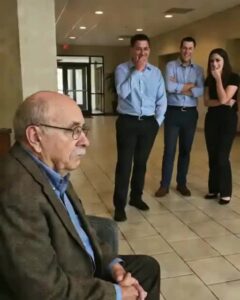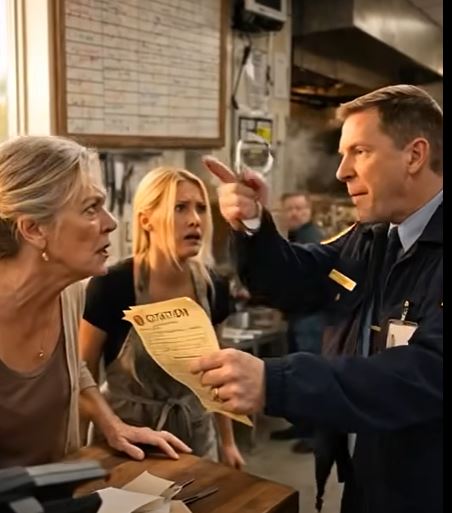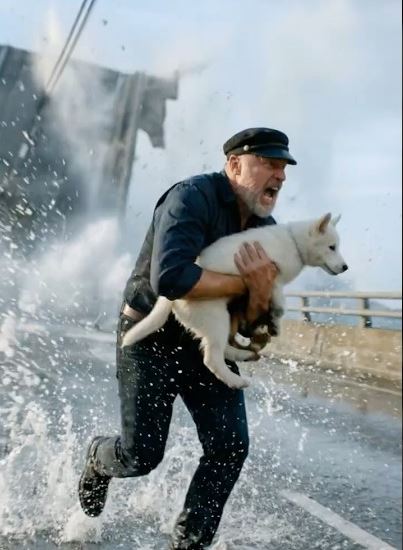He came in wearing a wrinkled coat and well-worn shoes. No badge. No assistant. Just a man in his late seventies carrying a folder and humming a classic tune.
“Excuse me, sir,” the receptionist said, glancing nervously. “This lobby is for clients and staff only.”
“Oh, I know,” he smiled. “I’m just here for a meeting.”
A group of junior employees passed by and snickered.
“Probably another retiree,” one of them whispered.
“Maybe he’s here to fix the coffee machine,” another joked.
No one offered him a seat.
The receptionist called upstairs, then hung up and looked startled. “They said… to send you right up.”
The laughter stopped.
He took the elevator alone.
Ten minutes later, a senior executive rushed into the lobby, eyes wide. “Where did he go? Was he just here?”
They pointed upstairs. “Room 14C.”
He muttered something under his breath and ran.
Because the man they had laughed at?
He was the founder. The majority shareholder. The reason the company existed.
And now the door to the boardroom was closed.
The Founder
Silviu’s name wasn’t well-known to most of the staff. The younger employees saw his portrait once a year during the company’s anniversary party, framed by balloons and lights, like a symbol. They didn’t expect him to show up.
But he had been observing. Listening.
In that boardroom, behind the closed door, ten directors sat up straighter, as it had been years since they had seen Silviu in person. Some thought he had sold his shares, others assumed he had retired, but they were all wrong.
The folder he carried wasn’t filled with financial reports, it was filled with notes on people. His company.
The Problem
Silviu spent the last six months quietly talking to former employees—janitors, managers, and interns—without fanfare. He had listened to their concerns and learned troubling things.
The company, once modest and close-knit, had become cold and impersonal. There were whispers of disrespect, of employees being overlooked, and promotions based on popularity, not merit. Layoffs were disguised as “optimizations,” and at the heart of it all, pride had taken precedence over purpose.
The Meeting
Silviu sat at the long table. No one spoke.
Finally, he opened the folder.
“Who approved the firing of the maintenance team last December?”
Dorian, the COO, cleared his throat. “That decision was made by Facilities, with my approval. We outsourced for efficiency.”
“Hmm,” Silviu nodded. “I met your outsourced cleaners last week. They missed the mold under the fifth-floor sink. The old crew never would have.”
No one spoke.
“And who decided to remove the scholarship fund for employees’ children?”
Again, Dorian spoke. “It was low ROI, based on the numbers. HR recommended reallocating the funds.”
Silviu looked up. “Do you have children, Dorian?”
“Yes, sir.”
“Then you’ll understand why I reinstated the fund yesterday.”
A few directors exchanged looks but remained silent.
“And one more thing,” Silviu continued. “There’s a receptionist named Irina. She’s been here four years. She was the only one who offered me a glass of water today.”
A pause.
“She stays. She gets a raise. And from what I read in her file, she’s due for a promotion.”
Silviu closed the folder and leaned back.
The Change
The room was still.
Then Silviu spoke again. “You’ve made this company successful, but you’ve lost touch with what truly matters. I built this company on kindness and purpose. We knew each other’s names back then. We celebrated births, mourned losses. Now, it’s all about numbers.”
Madalina, the CFO, spoke up. “With all due respect, sir, times have changed. Culture has to evolve.”
Silviu nodded. “You’re right. Culture should evolve, but not dissolve. There’s a difference.”
He opened a second, thicker folder.
“This is a list of employees who left in the last two years. I spoke to twenty of them. Seventeen cried on the phone. They didn’t leave because of money or workload. They left because they felt invisible.”
He slid the folder across the table.
“I won’t let this company become a place where good people disappear quietly.”
Another pause.
“Some of you will stay. Some of you won’t.”
Silviu stood. “I’ve asked Legal to prepare new contracts. I’ll be back tomorrow. If your name is on the list, you’ll be part of this company’s next chapter.”
With that, he walked out, humming a familiar tune.
—
**The New Direction**
The next day, the atmosphere in the building was different. People were quieter. HR avoided eye contact. Dorian paced in his office. Madalina hadn’t answered any calls.
When the new list came down, there were surprises.
Dorian wasn’t on it. Neither was Madalina.
Instead, some high-profile executives were quietly asked to step down.
In their place? People from the ground up. A logistics coordinator known for working long hours. A product designer who mentored new interns. Even the cafeteria manager, who once found Silviu’s lost phone, was appointed to a leadership council.
Irina, the receptionist, became Office Manager within a month.
—
**A Lasting Change**
Silviu didn’t return to the boardroom, but his influence was felt.
He introduced “Coffee Chats,” encouraging employees from different departments to meet once a month and talk without any agenda—just to listen.
He also reinstated the Founder’s Fund, an annual award for kindness, voted on by employees. The first winner was Andrei, a junior developer who once spent three nights helping a colleague finish a project.
The change wasn’t immediate, but it was real. People felt proud again. Internal referrals increased. Resumes stopped flowing out.
A Quiet Legacy
Silviu returned to his small home, with its overgrown garden and a peaceful cat. He didn’t need accolades. He never had.
But sometimes, the company would send him a newsletter. Photos, names, and always a note in the corner: “To the man who reminded us that people come first.”
Months later, Irina, now leading her own team, walked past the lobby. She saw a young man in a suit helping an older woman with the elevator buttons.
He wasn’t trying to stand out. He looked familiar.
Later, when reviewing the list of new interns, she paused at a name: Sebastian Voicu.
Silviu’s grandson.
He had joined the company, quietly. Just like his grandfather, he started with a smile.
Life has a way of reminding us what truly matters.
Titles fade. Bonuses get spent. But the way we treat people? That leaves a mark.
If you’ve ever been overlooked, remember that the quiet ones sometimes have the loudest truths. And if you’re in a position to lift someone up, start now.
You never know whose story you’re helping to rewrite.




